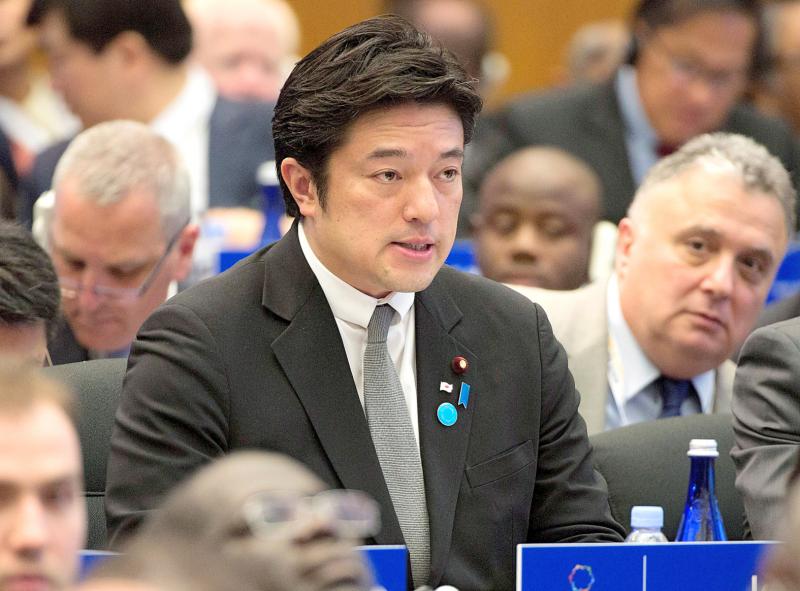Japanese State Minister of Defense Yasuhide Nakayama on Monday warned of a growing threat posed by Chinese and Russian collaboration, and said it was necessary to “wake up” to Beijing’s pressure on Taiwan and protect it “as a democratic country.”
Speaking to the Hudson Institute think tank, Nakayama questioned whether the decision of many countries, including Japan and US, to follow a “one China” policy that has recognized Beijing over Taipei since the 1970s would stand the test of time.
“Was it right?” he asked at the online event, referring to how future generations would judge policymakers on the issue. “I don’t know.”

Photo: Reuters
Democratic countries have to protect each other, he said, adding that he had in the past referred to Taiwan as a “red line.”
“So we have to protect Taiwan as a democratic country,” he said.
Japan and Taiwan are geographically close, and if something happened in Taiwan, it would affect Japan’s Okinawa Prefecture, where US forces and their families are based, he said.
“We are not friends of Taiwan, we are brothers,” he said.
Nakayama highlighted growing threats posed by China in space, in missile technology, in the cyberdomain, and in nuclear and conventional forces, and said that under Chinese President Xi Jinping’s (習近平) leadership, it had “aggressive, aggressive ... thought and will.”
“So wake up. We have to wake up,” he said.
Nakayama’s comments drew an angry response from Beijing, with Chinese Ministry of Foreign Affairs spokesman Wang Wenbin (汪文斌) saying: “We deplore the erroneous remarks by the senior official of the Japanese government, and we have lodged solemn representations.”
Nakayama had “falsely accused” China over “normal national defense developments,” he told a regular media briefing.
“This is highly sinister, dangerous and irresponsible. This politician also openly called Taiwan a country, in serious violation of the China-Japan joint statement,” he said.
“We urge the Japanese government to make a clarification and ensure this will not happen again,” he said.
Nakayama said it was necessary to show deterrence to China as well as Russia, which had stepped up exercises in Japanese-claimed territory and near Hawaii.
“You can see China and Russia collaborating together, when they are doing some military exercise around our neighbors,” Nakayama said, adding that he wanted to see the US “stronger, stronger and stronger.”
Additional reporting by Bloomberg

The Central Election Commission has amended election and recall regulations to require elected office candidates to provide proof that they have no Chinese citizenship, a Cabinet report said. The commission on Oct. 29 last year revised the Measures for the Permission of Family-based Residence, Long-term Residence and Settlement of People from the Mainland Area in the Taiwan Area (大陸地區人民在台灣地區依親居留長期居留或定居許可辦法), the Executive Yuan said in a report it submitted to the legislature for review. The revision requires Chinese citizens applying for permanent residency to submit notarial documents showing that they have lost their Chinese household record and have renounced — or have never

A magnitude 5.6 earthquake struck off the coast of Yilan County at 12:37pm today, with clear shaking felt across much of northern Taiwan. There were no immediate reports of damage. The epicenter of the quake was 16.9km east-southeast of Yilan County Hall offshore at a depth of 66.8km, Central Weather Administration (CWA) data showed. The maximum intensity registered at a 4 in Yilan County’s Nanao Township (南澳) on Taiwan’s seven-tier scale. Other parts of Yilan, as well as certain areas of Hualien County, Taipei, New Taipei City, Taoyuan, Hsinchu County, Taichung and Miaoli County, recorded intensities of 3. Residents of Yilan County and Taipei received

Taiwan has secured another breakthrough in fruit exports, with jujubes, dragon fruit and lychees approved for shipment to the EU, the Ministry of Agriculture said yesterday. The Animal and Plant Health Inspection Agency on Thursday received formal notification of the approval from the EU, the ministry said, adding that the decision was expected to expand Taiwanese fruit producers’ access to high-end European markets. Taiwan exported 126 tonnes of lychees last year, valued at US$1.48 million, with Japan accounting for 102 tonnes. Other export destinations included New Zealand, Hong Kong, the US and Australia, ministry data showed. Jujube exports totaled 103 tonnes, valued at

BIG SPENDERS: Foreign investors bought the most Taiwan equities since 2005, signaling confidence that an AI boom would continue to benefit chipmakers Taiwan Semiconductor Manufacturing Co’s (TSMC, 台積電) market capitalization swelled to US$2 trillion for the first time following a 4.25 percent rally in its American depositary receipts (ADR) overnight, putting the world’s biggest contract chipmaker sixth on the list of the world’s biggest companies by market capitalization, just behind Amazon.com Inc. The site CompaniesMarketcap.com ranked TSMC ahead of Saudi Aramco and Meta Platforms Inc. The Taiwanese company’s ADRs on Tuesday surged to US$385.75 on the New York Stock Exchange, as strong demand for artificial intelligence (AI) applications led to chip supply constraints and boost revenue growth to record-breaking levels. Each TSMC ADR represents